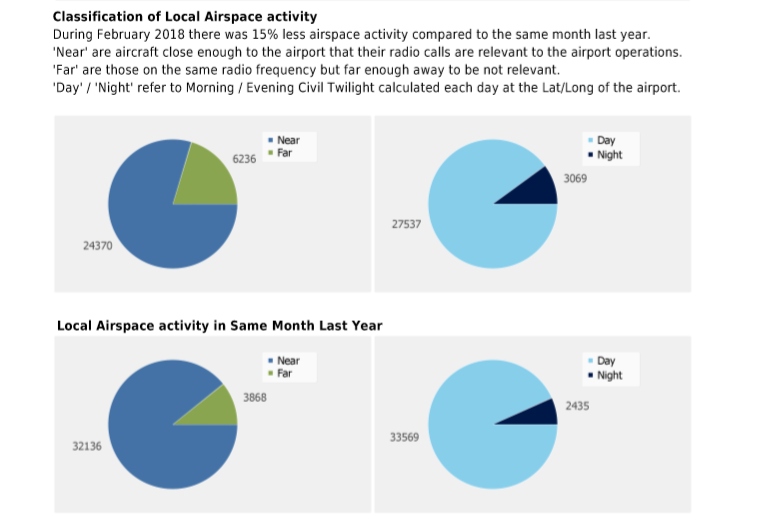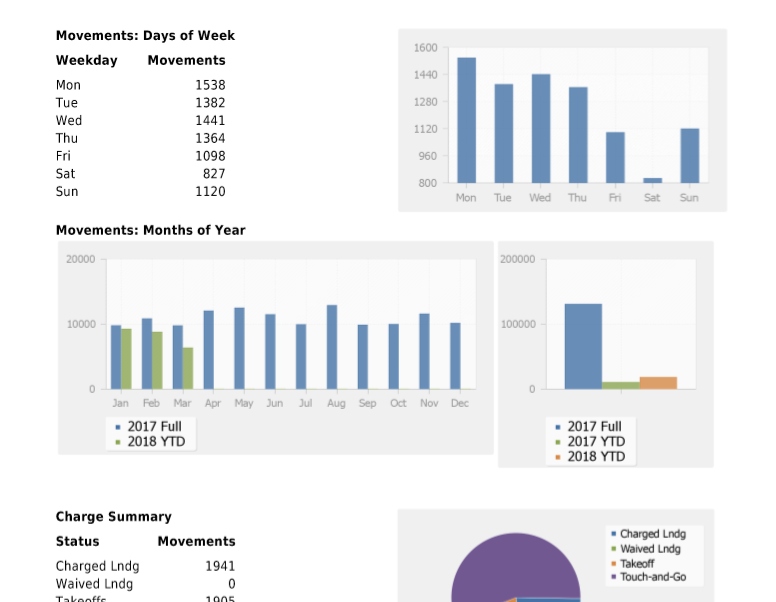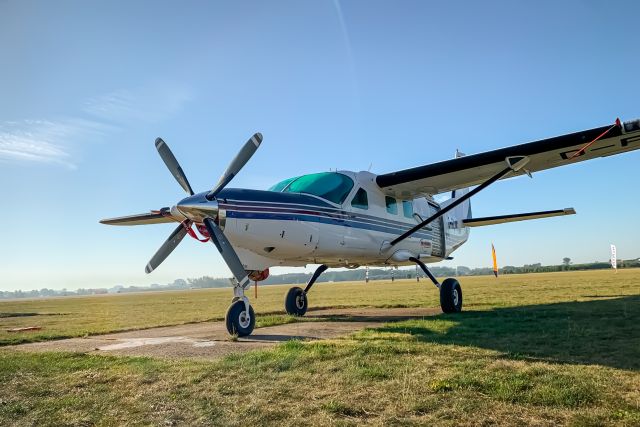
This part of the monthly 'Dashboard' Report shows that activity in the airspace has decreased by 15% overall, but the night activity has increased by 26% since the same month last year. Has someone started carrying out night training that is upsetting the neighbours? Does there need to be a curfew, or a night surcharge on landing fees to encourage night flights to be limited to what is absolutely necessary? With this level of reporting the Airport manager can 'drill down' to make effective decisions from a position of knowledge.
Complaint Resolution is important for Airports
It is important to take seriously any Noise Complaints, or other Complaints about Aircraft, and handle them sympathetically and quickly.
Whether you think that the complainant is being reasonable or not, they have been inconvenienced to the point that they have been motivated to do something about it, so it is clearly important to them. Fortunately, most complaints are about a flight which is within the flight rules, or doesn't involve your Airport, and if the time is taken to discuss the problem sympathetically it can usually be resolved.
SPEED of RESOLUTION is important... by the time someone phones you, they are angry... and you need to get back to them quickly with answers before their anger builds on itself and they escalate the complaint... there will be a lot of paperwork to fill in once a complaint is in motion at multiple levels.
Aimm has mechanisms to remotely listen to radio calls up to the last few minutes at the Airport, make it possible to work out who was doing what, and usually why... which often satisfies the complainant. Because of Aimm's remote playback mechanisms, radio calls can be listened to on a mobile device, which makes for quick investigation without needing a visit to the airport after hours.
MODERN AIRCRAFT are getting a lot quieter, but they still make much more noise than motor vehicles. Complainants usually accept that the Airport is providing an essential service (one that they use themselves), and they're not asking for it to be shut down... they just want some change made so that it affects them less. This is often possible, but even if not it will help the situation by listening carefully and doing your best to resolve it.
How to handle Complaints about Aircraft?
The Aimm Team have helped many Airports handle Noise complaints over the years, including one where an aggrieved neighbour organised a local group to try to get the Airport shut down. This was handled successfully, the neighbours are now supportive of the Airport, and it has had very few complaints since. From these experiences some strong pointers have emerged on how to deal with the complaint, investigate and respond.
Initially, listen to what the complainant says and get specific details of what is annoying them, and assure them that you do realise it is causing a problem and WILL investigate, and will get back to them soon with some answers. They will initially assume that they are going to be 'brushed off' and once they realise that this is not the case, it takes the emotion out of the situation. A general statement like, "An aircraft flew right over my roof last weekend just missing the trees" or "The noise drives me mad" don't give much to go on, so ask the complainant to take note and write it down next time the situation occurs, and give you the exact details so that you can investigate.

It helps to have a Complaints Form available for them to note details: "A Black Helicopter flew over my roof at 10:56 on Saturday 23rd heading north" lets you listen to the radio calls for a few minutes either side of 10:56 to see who it was and what they were doing... usually it then becomes obvious why they were low. Tell the complainant that you will investigate carefully, and ask them to keep a written log of events for you so you can follow it up to find out exactly what was happening, why, and what can be done about it.
Usually the log shows the complainant that the problem is not nearly as bad as they think... the 'noise all weekend' may just be 30 seconds of noise on three occasions. Once the complainant is asked to be specific and keep a log, and they realise that they are being listened to and will be taken seriously, many complaints solve themselves and you don't hear back. If they do get back to you with the log you should investigate, and get back to the complainant quickly.

Another part of the 'Dashboard', showing that this the first three months of this year will have generated less noise than the same period last year. Having this kind of detailed data available will assure compliance officers (though not necessarily the complainant) that the noise has not increased.
Investigating Noise and other Aircraft Complaints
Listen to the Radio Calls for 10 minutes either side of the time of the event complained about.
- In many cases the event will be a Rescue Helicopter attending an accident, or other emergency event. Rescue aircraft fly at unusual times and altitudes and generate many complaints from those who don't know what is happening. Complainants will drop their complaint immediately in these cases, and often apologise for troubling you. Both you and the complainant will be happy with this result, and they won't be nearly as quick to complain again.
- If the problem is flight training, skydiving, gliding tugs, aerobatics etc, you can ask the pilots involved to vary the flight path as much as possible so the noise footprint is spread. Propellor planes with high performance engines sometimes take off with the prop tips moving faster than the speed of sound, which creates a very loud and annoying whine... they can be asked to throttle back slightly once in the air to get the prop tips below the critical speed, which greatly reduces the whine for a minimal affect on aircraft performance. These types of operational problems should be referred to the Airport Safety Committee for advice from experienced aviators, who will also know how to advise pilots of their recommendations.
- If it happens that nothing can be done about the noise, just the knowledge that you've taken it seriously and considered all the options will make a difference... the major problem is often that the complainant feels they are being ignored, as much as the noise itself.
How does Aimm help with Complaint Resolution?
Aimm greatly assists resolution by making all the pilot radio calls immediately accessible. It records and archives every radio call on the airport radio frequency, not just the revenue generating calls. They can be played back from anywhere by authorised airport staff members, from any device that can access the Internet and play a '.wav' file (most can). Usually just listening to the radio calls from the time of a reported problem will make the cause immediately obvious, and the solution obvious too, leading to a quick resolution before the aggrieved person involves more of their neighbours.
At one Aimm Client airport, an annoyed local resident phoned to complain "One of your planes is flying up and down the river at very low level and is frightening my horses, I want this stopped immediately and you'll be paying any vet bills..." which immediately became "I'm sorry to have troubled you" when the Airport manager was able to listen to the radio calls from a few minutes ago on his home computer, and get back immediately to the complainant with, "Unfortunately that is a Coastguard Plane searching for a child who has fallen into the river."

The Aimm reports, with every movement listed, can be retrospectively analysed to identify the times, days of the week, and frequency of various activities. If a flight training organisation is pushing the neighbour's tolerance too hard it might be necessary to say, "no circuit training after 9pm" or similar. Having the ability to analyse all movements (Touch and Go and Takeoffs in addition to Landings), gives the full picture and the ability to make informed decisions as to the solution. "Good numbers make for good decisions.".
Aimm provides a cost-effective system that enables complaints to be investigated, and resolved quickly before they escalate. Plus Landing Fee Billing, Management Reporting, Regulatory Compliance Reporting, Risk Management and Funding Data.

How to know if Aimm will meet my Airfield / Airport's needs?
Have a chat with the Aimm Senior Management, who are Airport Managers themselves. Each Airport has its own specific challenges and opportunities, and if Aimm can provide better assistance than your current movement monitoring method, try it and see... Aimm does not require a commitment or set length contract, and any Client can discontinue the system anytime without penalty. We get very few who do not continue and the Aimm system is able to stand on its own performance.
Aimm's Services to Airports
Aimm monitors ALL movements and captures better than 99% of relevant Takeoffs, Landings, Touch-and-Goes at most Airports:
- Airside Personnel Tracker: Who is Airside? Where did they go? When?
- Landing Fees: Cost Effective Billing of Fees
- ADSB, Reports, Statistics and full Data for effective management and reporting
- Regulatory Compliance including CASA (Australia) and CAA (NZ) Part 139 Reporting
- Risk Management, Health and Safety, Incident Investigation
- Complaint Resolution and Noise Management
- Funding for Airports, Revenue generation, Grant Applications, Airport Master Plans.